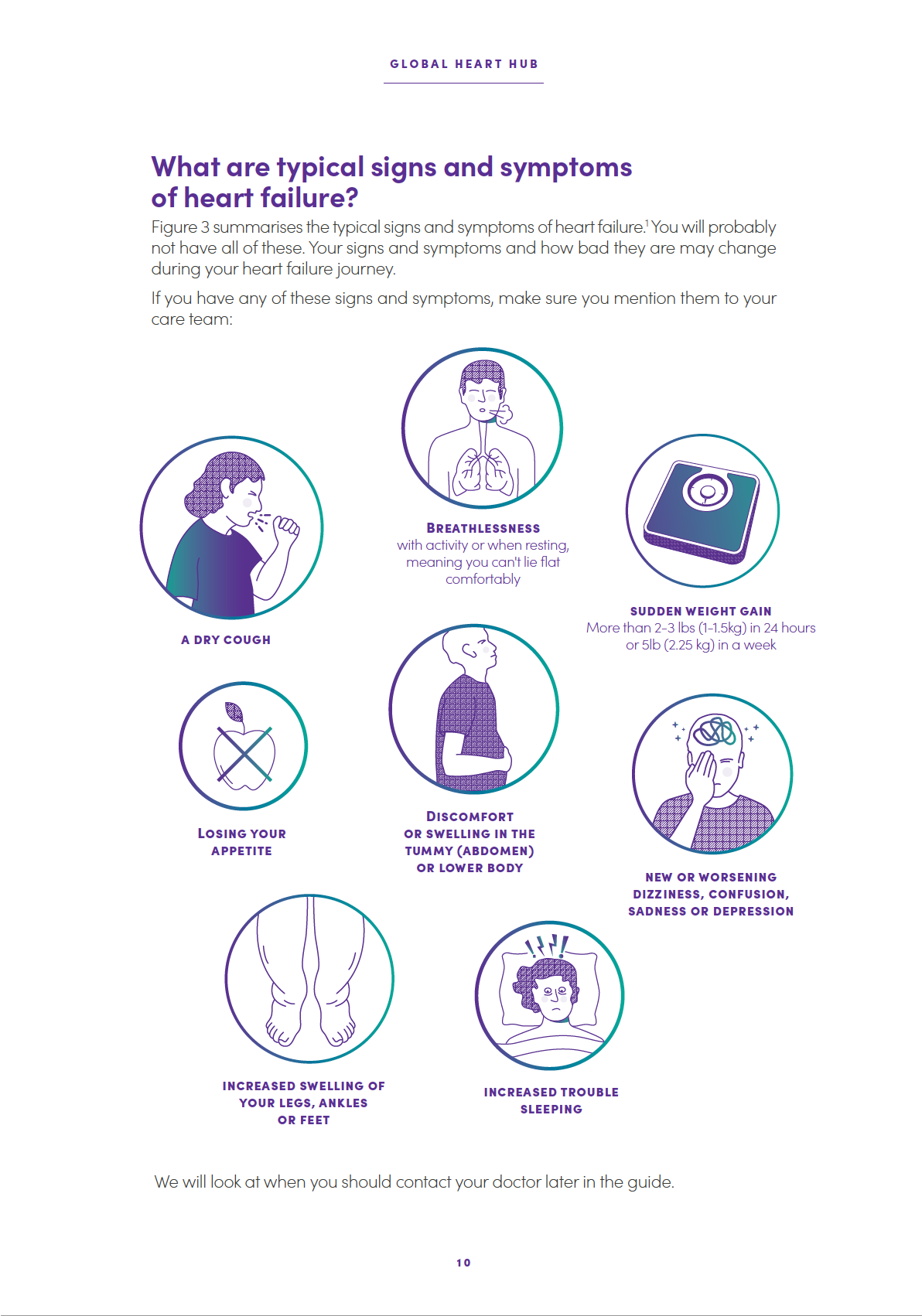Heart Failure Friendly Guide
What is the Global Heart Hub Heart Failure Friendly Guide?
Based on the most recent ESC and AHA Heart Failure clinical guidelines, the GHH Heart Failure Patient Council developed a ‘friendly’ guide, designed to support individuals who have been newly diagnosed with heart failure, those who are living with the condition, and their caregivers.
By providing clear and concise information that is tailored to the patient’s needs, this guide can help individuals to understand the optimal care pathway for heart failure, inform their expectations, and encourage a more informed patient-doctor shared decision making. This will enable people with heart failure and their carers to better manage the condition, improve outcomes, and enhance the overall quality of life for those affected by heart failure.
A common problem
Specialists say that between 1 in 50 and 1 in 100 adults have heart failure.1 Yet heart failure is often not noticed or is misdiagnosed.2 So, these figures are likely to be underestimates.1 In some cases, heart failure can take up to five years to be diagnosed. The delays in diagnosis can be especially long for young people with heart failure. Heart failure can happen at any age but is more common as we get older. 2 Other conditions or comorbidities, such as high blood pressure, heart attacks and abnormal heart rhythms (arrhythmias), can cause heart failure. People today are now more likely to develop comorbidities and survive with them for longer.2,3
Your Guide to Your Heart Failure Journey
This guide aims to help people with diagnosed heart failure and those currently being checked to see if they have heart failure, as well as their caregivers. This guide also aims to help people at high risk of developing heart failure because of their comorbidities. For some of these people, lifestyle changes and medicines can help stop heart failure from happening.4
The aim of this guide is to empower people affected by heart failure to take an active role in their care and make informed decisions about their treatment. It provides clear information that may help people with heart failure and their caregivers to understand better the causes and symptoms of heart failure, how it is diagnosed and managed, and the importance of lifestyle changes such as diet and exercise. The guide emphasises the importance of regular monitoring of the condition, taking medications as prescribed, and working closely with healthcare professionals to manage the condition effectively.
Translated versions of the Guide
Heart Failure Friendly Guide Summaries
We are delighted to introduce eight summary documents based on the GHH Heart Failure friendly Guide.
These summaries present key information from each section of the main Guide. The 8 summaries allow for easy printing so you can take them to the doctor’s visit easily, mark down the areas patients might need more clarification from their doctors or simply add your own notes. Our Guide summaries are created in a way for people with heart failure and their caregivers to have all key information anytime and anywhere, where the main friendly Guide document is for those who seek in-depth information with examples and guidance.
References
1. McDonagh TA, Metra M, Adamo M et al. 2021 ESC Guidelines for the diagnosis and treatment of acute and chronic heart failure. European Heart Journal 2021;42:3599-3726
2. Jones NR, Roalfe AK, Adoki I et al. Survival of patients with chronic heart failure in the community: a systematic review and meta-analysis. European Journal of Heart Failure 2019;21:1306-1325
3. Borlaug BA. Evaluation and management of heart failure with preserved ejection fraction. Nature Reviews Cardiology 2020;17:559-573
4. Heidenreich PA, Bozkurt B, Aguilar D et al. 2022 AHA/ACC/HFSA Guideline for the Management of Heart Failure: A Report of the American College of Cardiology/American Heart Association Joint Committee on Clinical Practice Guidelines. Circulation 2022;145:e895-e1032
Project developed by Global Heart Hub Heart Failure Patient Council
For more information, please contact: info@globalhearthub.org


Contact Us
Useful Links
Copyright 2026 Global Heart Hub. All Rights Reserved.
Copyright 2025 Global Heart Hub | All Rights Reserved







